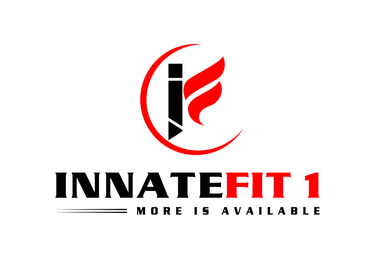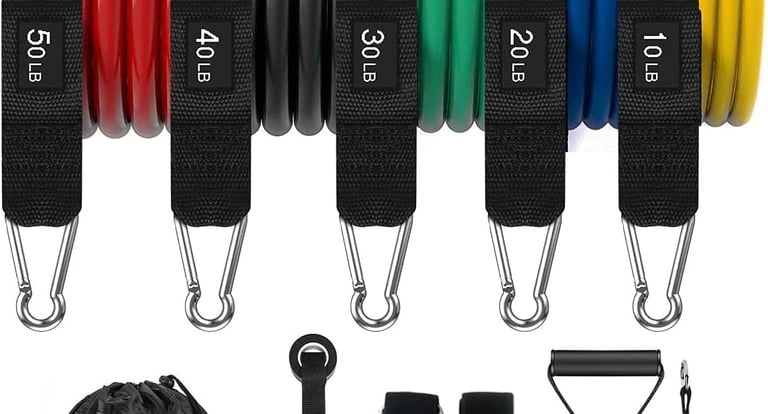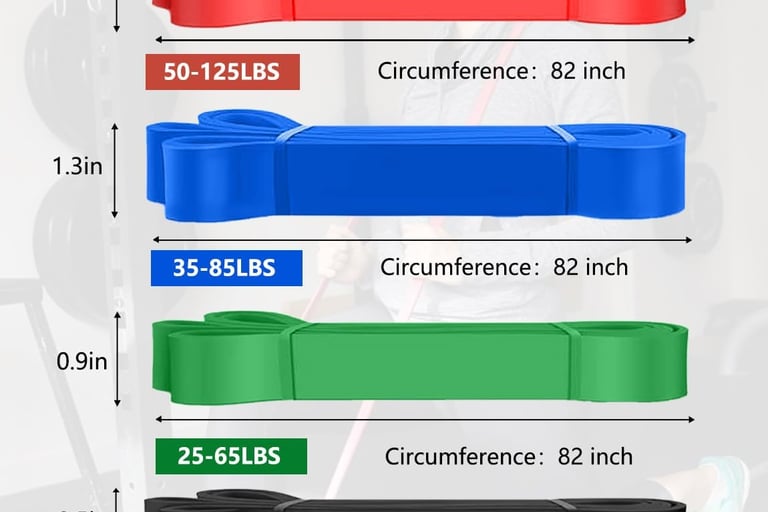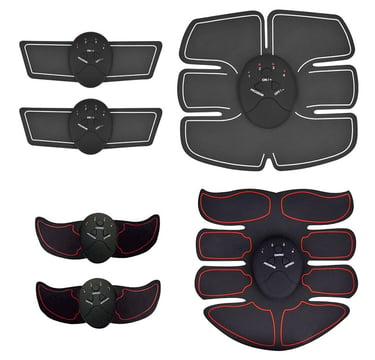Visit Innatefit1.com for exercise wear and equipment!!!
Resistance Bands to the Rescue: Your Ultimate Guide to Beginner Strength Gains
In a world filled with gym memberships, crowded spaces, and intimidating equipment, starting a fitness journey can feel daunting—especially for beginners. But what if the perfect solution for building strength was right in your living room?
WORKOUTSFITNESS TIPS
Joseph Battle
11/26/20244 min read
In a world filled with gym memberships, crowded spaces, and intimidating equipment, starting a fitness journey can feel daunting—especially for beginners. But what if the perfect solution for building strength was right in your living room?
At-home workouts for beginners using resistance bands and bodyweight strength training offer a powerful, cost-effective, and beginner-friendly way to jumpstart your fitness journey. This ultimate guide explores how resistance bands and bodyweight exercises can set you up for sustainable strength gains.
Strength Starts at Home: Why Resistance Bands Are Beginner-Friendly
Strength training doesn’t require heavy machinery or barbells. For beginners, resistance bands are a game changer. These stretchy, lightweight tools offer variable resistance, making them ideal for anyone new to strength training. Plus, they’re portable, affordable, and versatile.
The Beauty of Resistance Bands
Resistance bands are approachable for those wary of traditional weights. Here’s why:
Adjustable Intensity: Resistance bands come in different levels of resistance (light, medium, heavy), so you can gradually increase difficulty.
Joint-Friendly: Bands offer smooth, controlled movements, reducing strain on joints.
Adaptable Exercises: Whether targeting biceps, glutes, or core muscles, resistance bands accommodate a variety of exercises.
Why Beginners Thrive with Bands
Beginners often need exercises that prioritize form, balance, and control. Resistance bands guide movement patterns, helping prevent injuries. For example:
Supportive Squats: Wrapping a band above the knees during squats improves stability and posture.
Controlled Rows: A band secured to a door anchor can mimic gym-quality rows to strengthen the back.
Adding resistance bands to your at-home workouts ensures a full-body challenge, builds confidence, and introduces you to progressive overload—the key to muscle growth.
Bodyweight Strength Training Essentials for At-Home Fitness Enthusiasts
Pairing bodyweight strength training with resistance bands creates a well-rounded program for beginners. Before bands, mastering your body weight lays the foundation for strength.
Why Bodyweight Training Works
Bodyweight exercises are functional, teaching you to control your movements while activating multiple muscle groups. Think of:
Planks for core engagement
Squats for lower-body power
Push-ups for upper-body strength
Must-Have At-Home Essentials
You don’t need fancy tools for effective workouts. Create a functional space with:
A yoga mat for comfort
A sturdy chair for step-ups and dips
Open floor space for free movement
The Key Exercises to Build Muscle
Bodyweight Squats: Targets quads, hamstrings, and glutes. Add resistance bands later for progression.
Glute Bridges: Builds posterior strength. Place a band above your knees for extra activation.
Modified Push-Ups: A beginner-friendly way to strengthen the chest, shoulders, and triceps.
Start slow, focusing on proper form. Once you’re comfortable, you’ll be ready to introduce resistance bands to your routine.
Mastering Push-Up Variations for Strength in Your Living Room
When it comes to push-up variations for strength, the possibilities are endless. Push-ups are fundamental to bodyweight training and ideal for at-home workouts for beginners.
Why Push-Ups Matter
Push-ups are a compound movement that targets:
Chest muscles (pectorals)
Shoulders (deltoids)
Core stability
Their versatility allows you to scale difficulty to suit your fitness level.
Beginner Push-Up Progressions
Wall Push-Ups: Stand facing a wall and push your body away. Great for absolute beginners.
Incline Push-Ups: Use a countertop or sturdy surface to make push-ups easier than floor-level.
Knee Push-Ups: Perform on the floor but with your knees as the pivot point for reduced intensity.
Advanced Variations with Bands
Using resistance bands can elevate your push-up game:
Banded Push-Ups: Loop a band across your back and hold the ends under your hands for added resistance.
Explosive Push-Ups: Add dynamic movements like clapping to develop power and speed.
With these progressions, push-ups become a cornerstone of your journey of strength.
Resistance Bands Workouts to Boost Strength Without Breaking the Bank
Resistance bands workouts deliver a gym-like experience for a fraction of the cost. The versatility of bands makes them invaluable for targeting every muscle group.
Full-body workouts with Resistance Bands
Incorporate the following moves into your at-home routine:
Bicep Curls: Step on the band and curl your arms upward.
Overhead Press: Hold the band with both hands and push upward to strengthen shoulders.
Lateral Band Walks: Loop a band around your thighs and step sideways to activate glutes and hips.
Creating Circuit Workouts
Combine these exercises into circuits for a time-efficient workout:
10 bicep curls
12 squats with a band
15 lateral band walks
Repeat the circuit 3-4 times for a full-body burn.
Not only are resistance band workouts effective, but they also eliminate the need for expensive gym equipment, making fitness accessible to everyone.
Building the Perfect Beginner Program Using Bands and Bodyweight
Consistency is the secret to fitness success. By combining bodyweight strength training and resistance band workouts, you can craft an effective program that fits your goals and lifestyle.
Sample 3-Day Program
Day 1: Full-Body Workout
Squats with bands: 12 reps
Push-ups: 10 reps
Plank hold: 30 seconds
Day 2: Upper Body Focus
Bicep curls with bands: 12 reps
Band rows: 10 reps
Overhead press: 12 reps
Day 3: Lower Body and Core
Glute bridges with bands: 15 reps
Lateral band walks: 12 reps per side
Side planks: 20 seconds per side
Tracking Progress
Keep a workout journal to note reps, sets, and resistance levels.
Gradually increase resistance or repetitions every two weeks.
This structured approach ensures steady progress, minimizing the risk of injury or burnout.
The Long-Term Benefits of At-Home Workouts for Muscle-Building Beginners
Starting your fitness journey at home offers numerous advantages that extend beyond strength building.
Convenience and Flexibility
There is no longer a commute to the gym or waiting for equipment. At-home workouts for beginners fit into any schedule, making it easier to stay consistent.
Cost-Effective and Sustainable
Resistance bands and bodyweight exercises eliminate the need for expensive gym memberships or gear. Plus, they’re portable, allowing you to maintain your routine while traveling.
Building a Lifelong Habit
By starting small and mastering foundational movements, you create a sustainable routine that grows with you. You can expand your at-home setup or transition to advanced workouts as your strength improves.
Conclusion
At-home workouts for beginners using resistance bands and bodyweight strength training are the perfect gateway to building strength, confidence, and long-term fitness habits. With the right tools, techniques, and a well-structured program, you can achieve incredible results—all without stepping foot in a gym. Start today and let these simple yet effective methods transform your fitness journey, one rep at a time.








